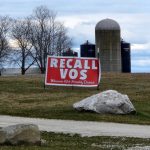Natural Resources Board Sees Widespread Public Support for State PFAS Standards
Elected leaders from communities across Wisconsin are calling on the Natural Resources Board (NRB) to approve state standards for harmful PFAS chemicals. The NRB will decide on Wednesday whether to approve the state’s first ever water quality standards for PFAS, which have been found at high levels in waters around Wisconsin, prompting numerous drinking water and fish consumption advisories.
“Everyone should be able to eat the fish they catch and drink the water flowing from their taps. But in dozens of communities across the state, PFAS contamination is putting our waterways at risk,” says Clean Wisconsin Water Program Director Scott Laeser. “As we begin to address pollution from these ‘forever chemicals,’ our actions must flow from water quality standards that—above all else—protect public health.”
“Our communities need help, and they deserve it now,” the letter states. “We cannot wait years to know what is in our water and begin the process of cleaning it up. Other states around us have already passed similar standards.”
Concern over PFAS pollution extends to virtually every corner of the state. Last week, Wisconsinites from more than 80 cities, towns and villages signed on to a Clean Wisconsin petition calling for state PFAS standards that will bring more testing and cleanup.
“We need standards now and widespread testing for PFAS pollution,” Laeser says. “Wisconsin families deserve to know whether the water they drink is safe, and only testing and enforceable standards can provide that peace of mind
PFAS are a group of chemical compounds used in a vast array of products, from firefighting foam to fast food wrappers. Product brands like Gore-Tex, Teflon, Stainmaster, and Scotchguard all contain PFAS chemicals, also known as “forever chemicals” because they don’t break down in the environment and can persist in the human body. High-level exposure to some types of PFAS are linked to a host of health impacts including reduced response to vaccines, lower birth weight, thyroid disease, increased cholesterol levels, liver damage, and kidney and testicular cancer.
NOTE: This press release was submitted to Urban Milwaukee and was not written by an Urban Milwaukee writer. While it is believed to be reliable, Urban Milwaukee does not guarantee its accuracy or completeness.
More about the PFAS Problem
- Gov. Evers Signs New PFAS, Lead Regulations - Danielle Kaeding - Mar 2nd, 2026
- Gov. Evers Builds Upon Efforts to Clean Up Wisconsinites Water, Approves New Rule Changes Strengthening Pfas Drinking Water Standards - Gov. Tony Evers - Mar 2nd, 2026
- PFAS Levels in Great Lakes Fish Are Dropping - Danielle Kaeding - Feb 6th, 2026
- Gov. Evers and GOP Lawmakers Near a Deal on PFAS Pollution - Danielle Kaeding - Jan 22nd, 2026
- Gov. Evers Optimistic About Reaching Final Deal With Republican Lawmakers to Secure Release of $125 Million in Long-Awaited Pfas Investments - Gov. Tony Evers - Jan 21st, 2026
- Bipartisan Push to Tell Counties Faster When Water Tests Fail - Henry Redman - Dec 19th, 2025
- MKE County: County Seeks to Sue PFAS Producers, Oil Companies - Graham Kilmer - Dec 10th, 2025
- Wisconsin Reviewing EPA-Approved Pesticides For PFAS - Danielle Kaeding - Dec 9th, 2025
- State Nears Settlement with Johnson Controls/Tyco Over PFAS Spills - Danielle Kaeding - Dec 4th, 2025
- Senate Bill Promotes Soybean-Based Firefighting Foam to Replace PFAS - Danielle Kaeding - Dec 2nd, 2025
Read more about PFAS Problem here
Mentioned in This Press Release
Recent Press Releases by Clean Wisconsin
Clean Wisconsin Sues Epa Over Repeal of Climate Protections
Feb 18th, 2026 by Clean WisconsinOverwhelming evidence shows climate change is already hurting Wisconsinites
New State Rule Will Help Wisconsin Renters Access Solar
Dec 1st, 2025 by Clean WisconsinRevised rule among the first to take effect after Evers v. Marklein Supreme Court decision






















